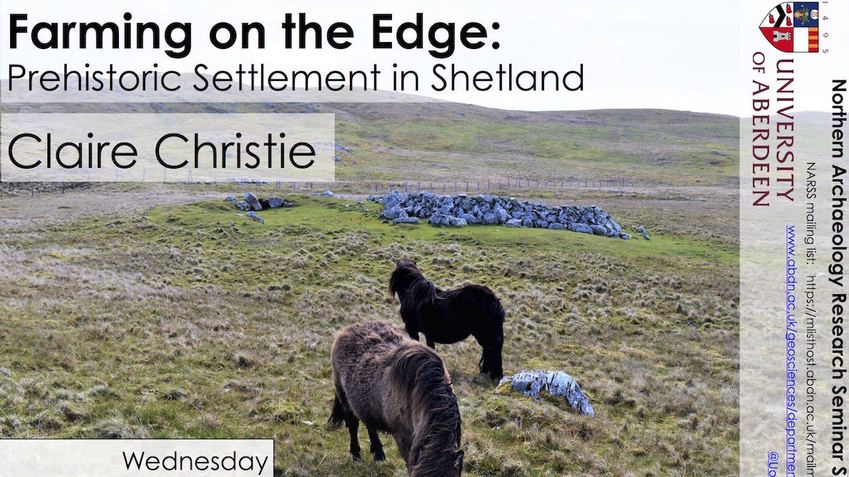Year of entry: 2021
We offer advanced training in human osteoarchaeology, delivered by the UK’s leading practitioners, and get the chance to study ancient biomolecules in world-class facilities. The course offers a unique opportunity to combine bioarchaeology with complementary subjects and tailor a course to suit your interests. Special funding opportunity for international students coming for a taught masters in Archaeology 2017-18! A range of funding opportunities can be found by searching the University of Aberdeen's central funding database. General information about funding sources available can also be found on the University of Aberdeen website. This one year Master’s programme provides students from a range of academic backgrounds with a broad-based postgraduate qualification in Archaeology, but with the option of pursuing specific archaeological specialisms, including Viking Archaeology, Museum Studies, Bioarchaeology, Osteoarchaeology and Palaeopathology. Palaeopathology is the study of past disease in human remains and a sub-discipline of bioarchaeology (study of human remains from archaeological sites). This intensive lecture, seminar and laboratory-based MSc involves lots of hands-on work with real skeletal remains from a variety of different sites and archaeological periods. Forensic Anthropology & Bioarchaeology - MRes at Wrexham Glyndwr University, listed on FindAMasters.com - a comprehensive database of Masters, MSc, MA, MPhil & MRes courses in the UK & Ireland.
Coronavirus information for applicants and offer-holders
We understand that prospective students and offer-holders may have concerns about the ongoing coronavirus outbreak. The University is following the advice from Universities UK, Public Health England and the Foreign and Commonwealth Office.

You should include details of your previous study, your research project title and the name of the academic member of staff you would like to supervise your research.
We strongly recommend that you make contact with your proposed supervisor before submitting an application.
Programme options
| Full-time | Part-time | Full-time distance learning | Part-time distance learning | |
|---|---|---|---|---|
| PhD | Y | Y | N | N |
| MPhil | Y | Y | N | N |
Programme description
Palaeontological and archaeological remains provide a unique window to the past that is essential for understanding how organisms, including humans, evolve and respond to long-term environmental change. Research within this area uses morphological, chemical and biomolecular studies of fossil and archaeological remains to investigate research questions concerning patterns of palaeobiodiversity, key evolutionary innovations such as flight and bipedalism, and the earliest genetic modifications of plants at the transition to farming.
Open days
Fees
For entry in the academic year beginning September 2021, the tuition fees are as follows:
- PhD (full-time)
UK students (per annum): Standard TBC, Band 1 £7,250, Band 2 £14,500, Band 3 £19,500
International, including EU, students (per annum): Standard £24,500, Band 1 £27,000, Band 2 £32,500, Band 3 £37,500 - PhD (part-time)
UK students (per annum): Standard TBC, Low £3,625, Medium £7,250, High £9,750
International, including EU, students (per annum): Overseas Standard £12,250, Band 1 £13,750, Band 2 £16,250, Band 3 £18,750
Further information for EU students can be found on our dedicated EU page.

Please note for the majority of projects where experimentation requires further resource: higher fee bands (where quoted) will be charged rather than the base rate for supervision, administration and computational costs. The fees quoted above will be fully inclusive and, therefore, you will not be required to pay any additional bench fees or administration costs.
All fees for entry will be subject to yearly review and incremental rises per annum are also likely over the duration of the course for UK/EU students (fees are typically fixed for International students, for the course duration at the year of entry). For general fees information please visit: postgraduate fees. Always contact the department if you are unsure which fee applies to your project.
Scholarships/sponsorships
Contact details
Archaeology Masters Programs Uk

Our internationally-renowned expertise across the School of Natural Sciences informs research led teaching with strong collaboration across disciplines, unlocking new and exciting fields and translating science into reality. Our multidisciplinary learning and research activities advance the boundaries of science for the wider benefit of society, inspiring students to promote positive change through educating future leaders in the true fundamentals of science. Find out more about Science and Engineering at Manchester.
Programmes in related subject areas
Bioarchaeology Masters Programs Uk
Use the links below to view lists of programmes in related subject areas.

Archaeology Masters Degree Uk
Regulated by the Office for Students
Bioarchaeology Masters Programs Uk Universities
The University of Manchester is regulated by the Office for Students (OfS). The OfS aims to help students succeed in Higher Education by ensuring they receive excellent information and guidance, get high quality education that prepares them for the future and by protecting their interests. More information can be found at the OfS website.
You can find regulations and policies relating to student life at The University of Manchester, including our Degree Regulations and Complaints Procedure, on our regulations website.
